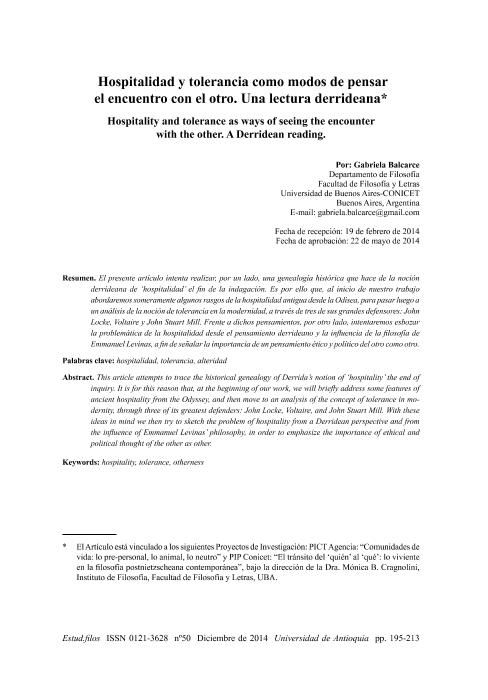Artículo
El presente artículo intenta realizar, por un lado, una genealogía histórica que hace de la noción derrideana de ‘hospitalidad’ el fin de la indagación. Es por ello que, al inicio de nuestro trabajo abordaremos someramente algunos rasgos de la hospitalidad antigua desde la Odisea, para pasar luego a un análisis de la noción de tolerancia en la modernidad, a través de tres de sus grandes defensores: John Locke, Voltaire y John Stuart Mill. Frente a dichos pensamientos, por otro lado, intentaremos esbozar la problemática de la hospitalidad desde el pensamiento derrideano y la influencia de la filosofía de Emmanuel Levinas, a fin de señalar la importancia de un pensamiento ético y político del otro como otro. This article attempts to trace the historical genealogy of Derrida's notion of 'hospitality' the end of inquiry. It is for this reason that, at the beginning of our work, we will briefly address some features of ancient hospitality from the Odyssey, and then move to an analysis of the concept of tolerance in modernity, through three of its greatest defenders: John Locke, Voltaire, and John Stuart Mill. With these ideas in mind we then try to sketch the problem of hospitality from a Derridean perspective and from the influence of Emmanuel Levinas' philosophy, in order to emphasize the importance of ethical and political thought of the other as other.
Hospitalidad y tolerancia como modos de pensar el encuentro con el otro. Una lectura derrideana
Título:
Hospitality and tolerance as ways of seeing the encounter with the other. A Derridean reading
Fecha de publicación:
12/2015
Editorial:
Universidad de Antioquia
Revista:
Estudios de Filosofía
ISSN:
0121-3628
Idioma:
Español
Tipo de recurso:
Artículo publicado
Clasificación temática:
Resumen
Palabras clave:
Hospitalidad
,
Tolerancia
,
Alteridad
Archivos asociados
Licencia
Identificadores
Colecciones
Articulos(SEDE CENTRAL)
Articulos de SEDE CENTRAL
Articulos de SEDE CENTRAL
Citación
Balcarce, Gabriela; Hospitalidad y tolerancia como modos de pensar el encuentro con el otro. Una lectura derrideana
; Universidad de Antioquia; Estudios de Filosofía; 50; 12-2015; 195-213
Compartir




